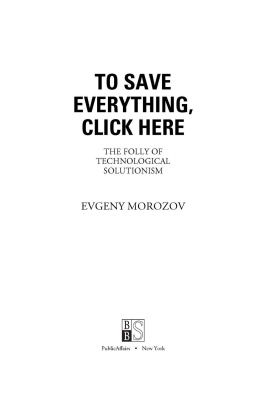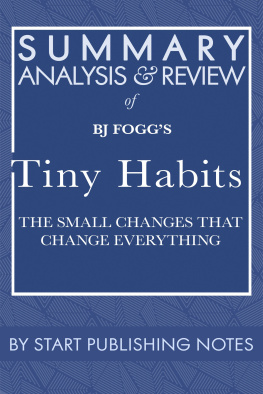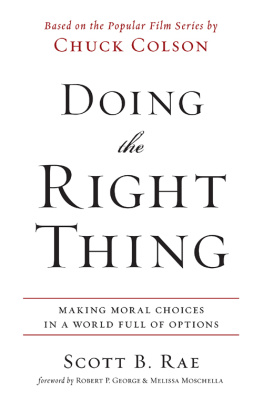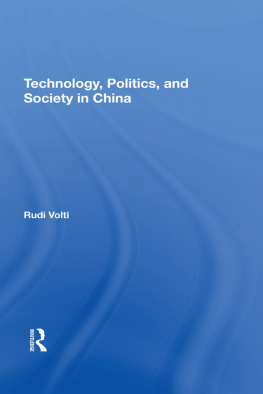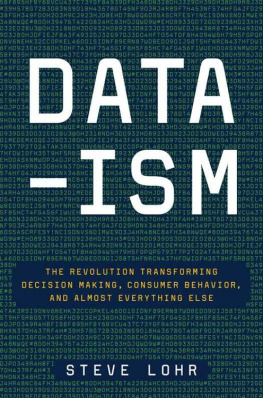Table of Contents
To my parents
Introduction
In an age of advanced technology,
inefficiency is the sin against the Holy Ghost.
ALDOUS HUXLEY
Complexity is a solvable problem in the right hands.
JEFF JARVIS
S ilicon Valley is guilty of many sins, but lack of ambition is not one of them. If you listen to its loudest apostles, Silicon Valley is all about solving problems that someone elseperhaps the greedy bankers on Wall Street or the lazy know-nothings in Washingtonhave created.
Technology is not really about hardware and software any more. Its really about the mining and use of this enormous data to make the world a better place, Eric Schmidt, Googles executive chairman, told an audience of MIT students in 2011. Facebooks Mark Zuckerberg, who argues that his companys mission is to make the world more open and connected, concurs. We dont wake up in the morning with the primary goal of making money, he proclaimed just a few months before his companys rapidly plummeting stock convinced all but its most die-hard fans that Facebook and making money had parted ways long ago. What, then, gets Mr. Zuckerberg out of bed? As he told the audience of the South by Southwest festival in 2008, its the desire to solve global problems. There are a lot of really big issues for the world to get solved and, as a company, what we are trying to do is to build an infrastructure on top of which to solve some of these problems, announced Zuckerberg.
In the last few years, Silicon Valleys favorite slogan has quietly changed from Innovate or Die! to Ameliorate or Die! In the grand scheme of things, what exactly is being improved is not very important; being able to change things, to get humans to behave in more responsible and sustainable ways, to maximize efficiency, is all that matters. Half-baked ideas that might seem too big even for the nafs at TED Conferencesthat Woodstock of the intellectual effetesit rather comfortably on Silicon Valleys business plans. Fitter, happier, more productivethe refreshingly depressive motto of the popular Radiohead song from the mid-1990swould make for an apt welcome sign in the corporate headquarters of its many digital mavens. Technology can make us betterand technology will make us better. Or, as the geeks would say, given enough apps, all of humanitys bugs are shallow.
California, of course, has never suffered from a deficit of optimism or bluster. And yet, the possibilities opened up by latest innovations make even the most pragmatic and down-to-earth venture capitalists reach for their wallets. After all, when else will they get a chance to get rich by saving the world? What else would give them the thrill of working in a humanitarian agency (minus all the bureaucracy and hectic travel, plus a much better compensation package)?
How will this amelioration orgy end? Will it actually accomplish anything? One way to find out is to push some of these nascent improvement efforts to their ultimate conclusions. If Silicon Valley had a designated futurist, her bright vision of the near futuresay, around 2020 or sowould itself be easy to predict. It would go something like this: Humanity, equipped with powerful self-tracking devices, finally conquers obesity, insomnia, and global warming as everyone eats less, sleeps better, and emits more appropriately. The fallibility of human memory is conquered too, as the very same tracking devices record and store everything we do. Car keys, faces, factoids: we will never forget them again. No need to feel nostalgic, Proust-style, about the petite madeleines you devoured as a child; since that moment is surely stored somewhere in your smartphoneor, more likely, your smart, all-recording glassesyou can stop fantasizing and simply rewind to it directly. In any event, you can count on Siri, Apples trusted voice assistant, to tell you the truth you never wanted to face back then: all those madeleines dramatically raise your blood glucose levels and ought to be avoided. Sorry, Marcel!
Politics, finally under the constant and far-reaching gaze of the electorate, is freed from all the sleazy corruption, backroom deals, and inefficient horse trading. Parties are disaggregated and replaced by Groupon-like political campaigns, where users come togetheronceto weigh in on issues of direct and immediate relevance to their lives, only to disband shortly afterward. Now that every wordnay, soundever uttered by politicians is recorded and stored for posterity, hypocrisy has become obsolete as well. Lobbyists of all stripes have gone extinct as the wealth of data about politicianstheir schedules, lunch menus, travel expensesare posted online for everyone to review.
As digital media make participation easier, more and more citizens ditch bowling aloneonly to take up blogging together. Even those whove never bothered to vote in the past are finally provided with the right incentivesnaturally, as a part of an online game where they collect points for saving humanityand so they rush to use their smartphones to check in at the voting booth. Thankfully, getting there is no longer a chore; self-driving cars have been invented for the purpose of getting people from place to place. Streets are clean and shiny; keeping them that way is also part of an elaborate online game. Appeals to civic duty and responsibility to fellow citizens have all but disappearedand why wouldnt they, when getting people to do things by leveraging their eagerness to earn points, badges, and virtual currencies is so much more effective?
Crime is a distant memory, while courts are overstaffed and underworked. Both physical and virtual environmentswalls, pavements, doors, log-in screenshave become smart. That is, they have integrated the plethora of data generated by the self-tracking devices and social-networking services so that now they can predict and prevent criminal behavior simply by analyzing their users. And as users dont even have the chance to commit crimes, prisons are no longer needed either. A triumph of humanism, courtesy of Silicon Valley.
And then, theres the flourishing new marketplace of ideas. Finally, the term marketplace no longer feels like a misnomer; cultural institutions have never been more efficient or responsive to the laws of supply and demand. Newspapers no longer publish articles that their readers are not interested in; the proliferation of self-tracking combined with social-networking data guarantees that everyone gets to read a highly customized newspaper (down to the word level!) that yields the highest possible click rate. No story goes unclicked, no headline untweeted; customized, individual articles are generated in the few seconds that pass between the click of a link and the loading of the page in ones browser.
The number of published books has skyrocketedmost of them are self-publishedand they are perfectly efficient as well. Many even guarantee alternative endingsand in real time!based on what the eye-tracking activity of readers suggests about their mood. Hollywood is alive and kicking; now that everyone wears smart glasses, a movie can have an infinite number of alternative endings, depending on viewers mood at a given moment as they watch. Professional critics are gone, having been replaced first by crowds, then by algorithms, and finally by customized algorithmic reviewsthe only way to match films with customized alternative endings. The edgiest cultural publications even employ algorithms to write criticism of songs composed by other algorithms. But not all has changed: just like today, the system still needs imperfect humans to generate the clicks to suck the cash from advertisers.

